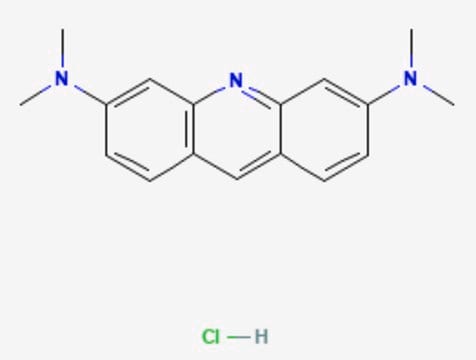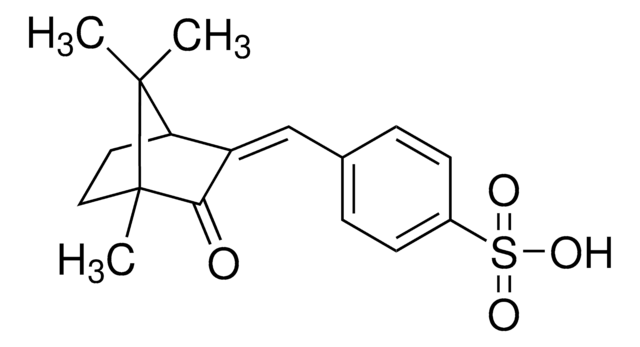A6014
Acridine Orange hemi(zinc chloride) salt
For nucleic acid staining in cells or gels
Synonym(s):
3,6-Bis(dimethylamino)acridine hydrochloride zinc chloride double salt, 3,6-Bis(dimethylamino)acridinium chloride hemi(zinc chloride salt), Basic Orange 14
About This Item
Recommended Products
Quality Level
product line
BioReagent
form
powder
composition
Dye content, ~80%
technique(s)
nucleic acid detection: suitable
solubility
ethanol: 2 mg/mL
4 mg/mL (2-methoxyethanol (EGME))
water: 6 mg/mL (Forms a clear, dark orange or amber solution at 1mg/mL.)
suitability
suitable for flow cytometry
suitable for microscopy
storage temp.
room temp
SMILES string
Cl[H].Cl[H].Cl[Zn]Cl.CN(C)c1ccc2cc3ccc(cc3nc2c1)N(C)C.CN(C)c4ccc5cc6ccc(cc6nc5c4)N(C)C
InChI
1S/2C17H19N3.4ClH.Zn/c2*1-19(2)14-7-5-12-9-13-6-8-15(20(3)4)11-17(13)18-16(12)10-14;;;;;/h2*5-11H,1-4H3;4*1H;/q;;;;;;+2/p-2
InChI key
RAHGLSRJKRXOSY-UHFFFAOYSA-L
Looking for similar products? Visit Product Comparison Guide
General description
Application
- detection of nucleic acids separated by gel electrophoresis
- fluorescence and epifluorescence microscopy
- analysis of mitochondria and lysosomes by flow cytometry
- DNA staining in apoptosis studies
Features and Benefits
- 120 microM of acridine orange detects 25-50 ng of purified DNA per band in gels
- differential staining of single- and double-stranded polynucleotides
Principle
related product
Signal Word
Warning
Hazard Statements
Precautionary Statements
Hazard Classifications
Muta. 2
Storage Class Code
11 - Combustible Solids
WGK
WGK 3
Flash Point(F)
Not applicable
Flash Point(C)
Not applicable
Personal Protective Equipment
Certificates of Analysis (COA)
Search for Certificates of Analysis (COA) by entering the products Lot/Batch Number. Lot and Batch Numbers can be found on a product’s label following the words ‘Lot’ or ‘Batch’.
Already Own This Product?
Find documentation for the products that you have recently purchased in the Document Library.
Customers Also Viewed
Articles
Fluorescence lifetime measurement is advantageous over intensity-based measurements. Applications include fluorescence lifetime assays, sensing and FLI.
Fluorescence lifetime measurement is advantageous over intensity-based measurements. Applications include fluorescence lifetime assays, sensing and FLI.
Fluorescence lifetime measurement is advantageous over intensity-based measurements. Applications include fluorescence lifetime assays, sensing and FLI.
Fluorescence lifetime measurement is advantageous over intensity-based measurements. Applications include fluorescence lifetime assays, sensing and FLI.
Our team of scientists has experience in all areas of research including Life Science, Material Science, Chemical Synthesis, Chromatography, Analytical and many others.
Contact Technical Service












